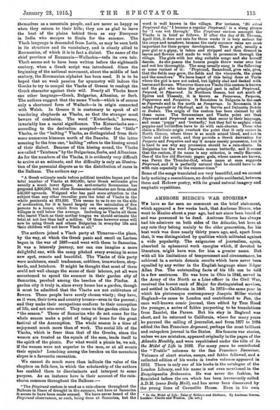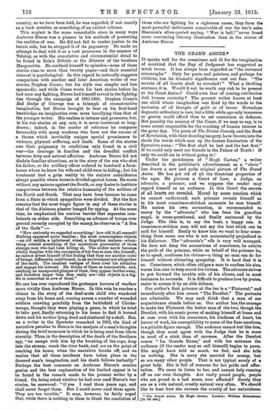AMBROSE BIERCE'S WAR STORIES.*
Ws have so far seen no comment on the brief statement, which appeared a few weeks back, that Ambrose Bierce, who went to Mexico about a year ago, had not since been beard of and was presumed to ha dead. Ambrose Bierce has always had his admirers on both aides of the Atlantic, but here at any rate they belong mainly to the elder generation, for his beat work was done nearly thirty years ago, and, apart from that, it was distinguished by qualities which militated against a wide popularity. The exigencies of journalism, again, absorbed in ephemeral work energies which, if devoted to literature, might have won for him a greater name. But with all his limitations of temperament and circumstance, he achieved in a certain domain results which have never been equalled by any writer in the English language since Edgar Allan Poe. The outstanding facts of his life can he told in a few sentences. He was born in Ohio in 1842, served in the Army of the North as a Line officer in the Civil War, received the brevet rank of Major for distinguished services, and settled in California in 1866. In 1872—the same year in which his picturesque contemporary Joaquin Miller visited England—he came to London and contributed to Fun, the once well-known comic journal, then edited by Tom Hood the younger, a series of fables purporting to be translations from Zambri, the Parsee. But his stay in England was short, and he returned to California, where for many years he pursued the calling of journalist, and from 1677 to 1884 edited the San Francisco Argonaut, perhaps the most brilliant and outspoken journal in the States. His famous war stories, unless we are mistaken, appeared originally in the pages of the Atlantic Monthly, and were republished under the title of In the Midst of Life in 1892. For many years be contributed the "Prattle" columns to the San Francisco Examiner. Volumes of short stories, essays, and fables followed, and a collected edition of his works in twelve volumes appeared in 1912. There is only one of his books in the catalogue of the London Library, and his name is not even mentioned in the Encyclopaedia Britannica. He was never the fashion, be flourished before the era which has been irreverently called A.D.M. (anno Daily Mail), and has never been discovered by the young lions of Carmelite House. Even in his own • In MS Mitts of Tau of Sullies and Civilian, By Amtsosa London: Chat. and "Wind.. 11, net.]
country, so we have been told, he was regarded, if not exactly as a hack number, as something of an extinct volcano.
This neglect is the more remarkable since in many ways Ambrose Bierce was a pioneer in his methods of presenting the realities of war. He did not fail to render justice to its heroic side, but he stripped it of its pageantry. He made no attempt to deal with it as a vast panorama in the manner of Tolatoy, or with the cumulative and circumstantial detail to be found in Zola's Debacle or the DIsastre of the brothers Margueritte. He confined himself to episodes—none of these stories runs to more than twenty pages—and their essential interest is psychological. In this regard he naturally suggests comparison with another and later American writer of war stories, Stephen Crane ; but his style was simpler and less spasmodic, and while Crane wrote his beat stories before he had seen any fighting, Bierce had himself served in the fighting line through the campaign of 1861-1865 Stephen Crane's Bed Badge of Courage was a triumph of reconstructive imagination, but Bierce brought to bear on his first-hand knowledge an imagination even more horrifying than that of the younger writer. His realism is intense and gruesome, but, in his war stories at any rate, it is never irrelevant or long- drawn ; indeed, in the matter of reticence he compares favourably with many moderns who have not the excuse of a theme which inevitably assigns special prominence to violence, physical suffering, and death. Some of the stories owe their poignancy to conditions only found in a civil war—the cleavage in families and the dreadful conflict between duty and natural affection. Ambrose Bierce did not disdain familiar situations, as in the story of the eon who shot his father, or the artillery officer ordered to bombard a farm- house where he knew his wife and child were in hiding ; but his treatment lent a grim reality to the sinister coincidences always possible where house is divided against house. He wrote without any animus againstthe South, or any desire to institute comparisons between the relative humanity of the soldiers of the North and South. That may have been because he oame from a State in which sympathies were divided. Bat the fact remains that the most tragic figure in any of these stories is that of the Alabama planter hanged for spying. At the same time, he emphasized the curious barrier that separates com- batants on either aide. Describing an advance of troops over ground recently occupied by the enemy, he observes in "A Son of the Gods" :— " How curiously we regarded everything ! how odd it all seemed! Nothing appeared quite familiar ; the most commonplace objects —an old saddle, a splintered wheel, a forgotten canteen—every- thing related something of the mysterious personality of those strange men who had been killing us. The soldier never becomes wholly familiar with the conception of his foes as men like himself ; he cannot divest himself of the feeling that they are another order of beings, differently conditioned, in an environment not altogether of the earth. The smallest vestiges of them rivet his attention and engage his interest. He thinks of them as inse,essible ; and, catching an unexpected glimpse of them, they appear farther away, and therefore larger than they really are—like objects in a fog. He is somewhat in awe of them."
No one has ever reproduced the grotesque horrors of warfare more vividly than Ambrose Bierce. In this vein he reaches a climax in the story of the deaf-mute child who wandered away from his home and, coming across a number of wounded soldiers crawling painfully from the battlefield of Chicka- mauga, thought they were playing a game, in which he tried to take part, finally returning to his home to find it burned down and his mother lying dead and shattered by a shell. But, as a writer in the Spectator remarked in 1892, the kind of narrative peculiar to Bierce is the analysis of a man's thoughts during the brief moments in which he is being sent from life to eternity. Thus, in the description of the death of the Southern spy, "we escape with him by the breaking of the rope, drop into the stream, reach the river bank, and are on the point of reaching his home, when the narrative breaks off, and we realize that all these incidents have taken place in the doomed man's imagination, and his death follows instantly." Perhaps the best comment on Ambrose Bierce's sombre genius and the beet explanation of his limited appeal is to be found in the remark made to the present writer by a friend. On being asked whether he had ever read Bierce's war stories, he answered "O yes. I read them years ago, and shall never forget them. But I could never read them again. They are too terrible." It may, however, be fairly urged that, while there is nothing in them to blunt the resolution of
those who are fighting for a righteous cause, they form the moat powerful indictment conceivable of war for war's sake. Sherman's often-quoted saying, "War is hell !" never found more convincing literary illustration than in the stories of Ambrose Bierce.



































 Previous page
Previous page